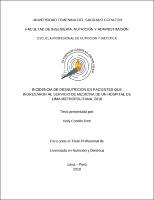Incidencia de desnutrición en pacientes que ingresaron al servicio de medicina de un hospital de Lima Metropolitana, 2016
Abstract
La desnutrición hospitalaria es un problema frecuente en el paciente hospitalizado que genera mayor morbimortalidad, peor respuesta al tratamiento, mayor estancia y costo hospitalario. Para ello se realizó un estudio descriptivo, observacional, de corte transversal, retrospectivo. Esta Investigación tiene como objetivo principal demostrar la Incidencia de desnutrición hospitalaria en los pacientes que ingresaron al servicio de medicina de un hospital de Lima Metropolitana, la muestra de estudio fueron adultos de 18 a 79 años de edad, que cumplían los criterios de inclusión que ingresan al Servicio de Medicina; para ello se realizó un tamizaje al ingreso, mediante la Valoración Global Subjetiva (VGS), luego se recolectó datos antropométricos y bioquímicos de las historias clínicas; cuyos datos se colocaron en una base de datos en Microsoft Excel y se analizó a través del programa estadístico SPSS versión 22 a través de estadísticas. Los resultados que se obtuvieron fueron: del 100% de los pacientes evaluados el 51.0% presentó desnutrición, siendo prevalente el género femenino. El 81.6% de los pacientes fueron normopeso, seguido sobrepeso con 14.3%. La desnutrición visceral fue de 77,6%, la anemia fue de un 61,2% siendo mayor en el género femenino. Hospital malnutrition is a common problem in the hospitalized patient. It generates greater morbidity and mortality, a worst response to treatment, longer stay and hospital costs. In this regard, a descriptive, observational, cross-sectional and retrospective study was done. This research has as main objective to show the incidence of hospital malnutrition in patients in the Department of medicine from a hospital in Metropolitan Lima, the study sample were both sexes adults over 18 to 79 years of age, that met the criteria for inclusion, placed in the service of medicine; to this end, it was done a screening at admission, using the Subjective Global Assessment (SGA) in patients, then we collected anthropometric and biochemical data from the medical histories. This data is placed in a database in Microsoft Excel and got analyzed with the SPSS version 22 through statistics. The results obtained were: the 100% patients assessed, the 51.0% was admitted with incidence of malnutrition assessed by VGS, being more prevalent in the female gender. 81.6% of the patients were by the normal weight, followed by overweight with 14.3%. The visceral malnutrition was 77.6%, the anemia was a 61.2% being higher in the female gender.
Description
Tesis


